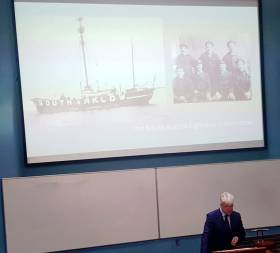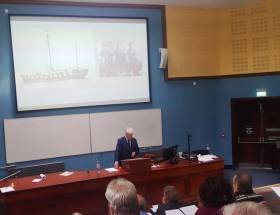Displaying items by tag: South Arklow Lightship
The Irish Lights issued a statement about the South Arklow Lightship that didn’t tell the full story.
Their official explanation that it was missing off station was that it had “disappeared.”
In reality it had been sunk!
Dr. Michael Kennedy of the Royal Irish Academy, who is also Executive Editor of ‘Documents on Irish Foreign Policy’, had a remarkable story to tell when he referred to the “Irish amnesiac condition” which has ignored the importance of the sea around our nation. His example, which has left a strong impression on me, is that the history of the First World War focusses strongly on the big land battles in Europe – but Ireland, the Irish coastline and seafarers were on the front line of that war… as were the men of the South Arklow Lightship.
He told me the story, which hasn’t had a lot of public attention, at a maritime history conference in University College, Cork.
Listen to Dr. Kennedy on the Podcast here and also to a tragic story about 338 sailors lost off Bloody Foreland and the rescue by RNLI of a team playing football.
• Tom MacSweeney presents THIS ISLAND NATION radio programme on local stations around Ireland
When The South Arklow Lightship Disappeared
The disappearance of the South Arklow Lightship during World War One when it was sunk by a German submarine has been highlighted at a maritime conference in University College Cork, as an example that the First World War was fought not only on foreign fields in Europe, but Ireland and mariners were on the front line. The conference – Winning the Western Approaches, Unrestricted Submarine Warfare and the US Navy in Ireland, 1917-18’ has been organised by UCC historian, author and lecturer, Dr.John Borgonovo and is attracting a lot of attention.
Dr.Michael Kennedy of the Royal Irish Academy spoke about Irish Lightkeepers and Lightships being on the Atlantic frontline during the war, of what they saw of the horrors of war, ships being attacked, mines laid by submarines to sink ships and seafarers’ lives lost. He described the attack on the South Arklow Lightship because of its reporting of what was happening. He also described a submarine reportedly firing at Mizen Head Lighthouse in West Cork.
“Lightkeepers saw at first hand the horrors of war, because of Ireland’s strategic location for shipping in the international context,” he said. That their service during the war had not been remembered was an example of the amnesiac memory of Ireland towards maritime affairs. His talk drew strong interest in the role of the men of the Irish Lights service during World War One.
When the South Arklow Lightship was sunk by a U-boat, it was described by Irish Lights at the time that “the lightship has disappeared.” All crew were safe.































































